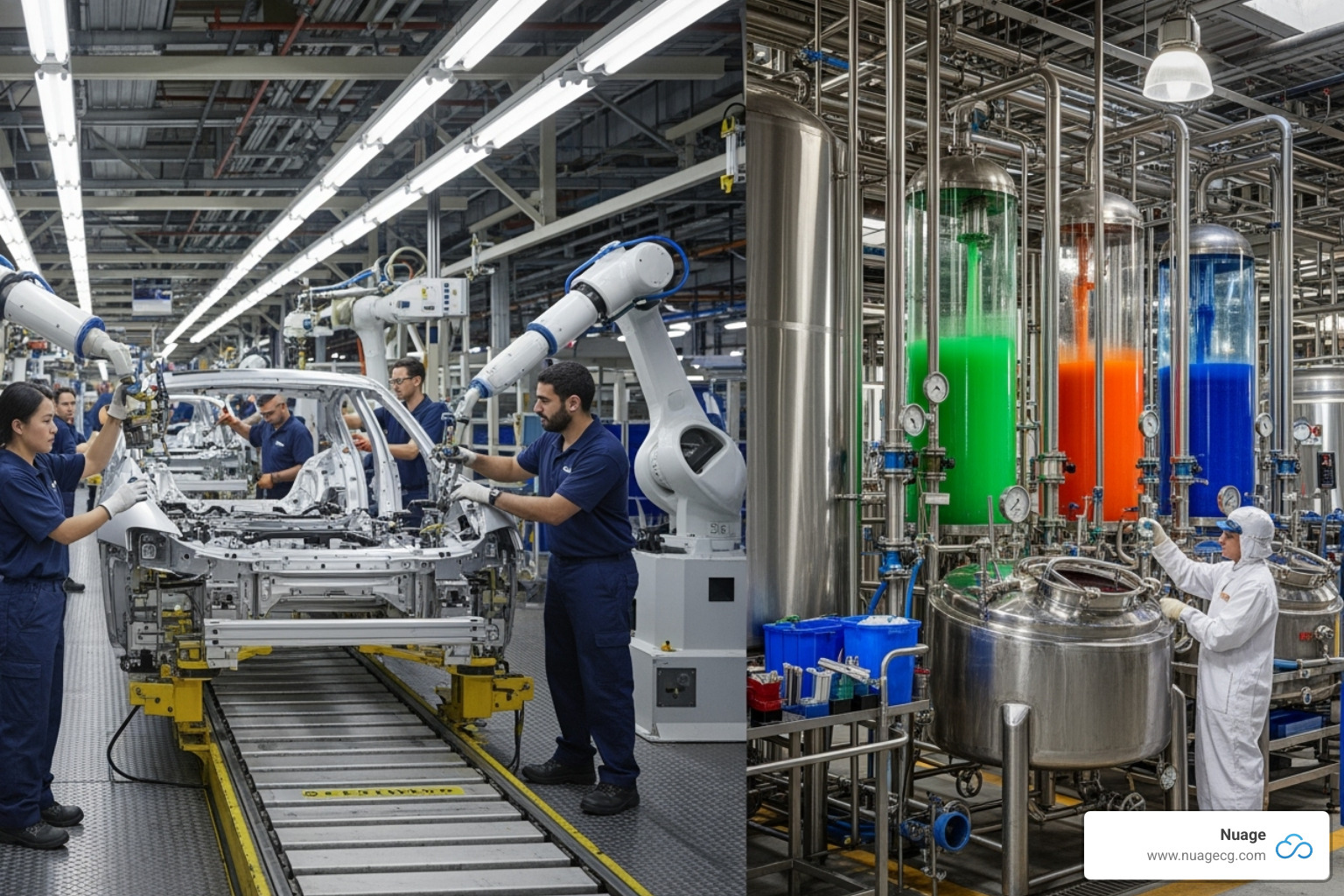Introduction

Spreadsheets once felt like magic; today they feel more like handcuffs. Copy-and-paste errors, stale numbers, and isolated files slow decision-making and hide problems until they become expensive. In contrast, a modern erp solution for manufacturing connects machines, people, and data in real time. According to a 2024 Forbes Advisor survey, 95 % of companies report measurable improvements after implementing ERP software. This guide shows why manufacturers are trading in spreadsheets for an integrated platform—and how Nuage can help you do the same.
Quick visual: imagine every transaction—from a shop-floor scan to a CFO dashboard—moving through one digital pipeline. That pipeline is manufacturing ERP.
What is a Manufacturing ERP? (And Why It’s Not Your Standard ERP)
Picture your manufacturing business as a living, breathing organism. In this analogy, an erp solution for manufacturing isn’t just another organ—it’s the central nervous system that makes everything work together. Just like your nervous system coordinates every function from your heartbeat to your thoughts, a manufacturing ERP connects and streamlines every process in your company, creating a single source of truth that keeps everyone on the same page.
Here’s where things get interesting: not all ERP systems are created equal. While a standard Enterprise Resource Planning system handles basic business functions like finance, HR, and sales across various industries, a manufacturing ERP is built for the unique challenges of making things. It’s the difference between a Swiss Army knife and a precision surgical instrument—both are useful, but one is specifically designed for complex, specialized work.
The story of ERP actually begins in manufacturing, stretching back over a century to simple paper-based production schedules. It evolved through Material Requirements Planning (MRP) in the 1960s, which focused on planning and controlling materials, before growing into the comprehensive systems we know today. Modern manufacturing ERPs often work hand-in-hand with Manufacturing Execution Systems (MES), creating seamless real-time control and visibility from the executive suite to the shop floor.
When we talk about digital change for manufacturers, we’re really talking about moving from scattered spreadsheets and manual processes to a unified, intelligent platform. It’s about giving your team the tools they need to make smart decisions quickly, whether they’re in the boardroom or on the factory floor. This change is what makes a modern erp solution for manufacturing so powerful. For more insights on this evolution, check out our guide on Digital Change for Manufacturers.
The Key Difference: Focus on the Shop Floor
The real difference between standard ERP and manufacturing ERP comes down to depth and specialization. Think of it like this: a general ERP is like your family doctor—great for overall health and handling common issues. A manufacturing ERP is like a specialist surgeon with deep expertise in the complex world of production.
While both systems handle core business functions like finance, HR, and sales, a manufacturing ERP dives deep into the nitty-gritty of making things. Production Planning and Scheduling goes beyond simple “what to make” to include complex capacity planning, resource optimization, and detailed scheduling that keeps production flowing smoothly. Bill of Materials (BOM) Management becomes more than just a parts list—it handles multi-level BOMs, tracks revisions, and even manages configurable BOMs for custom products.
Shop Floor Control brings real-time visibility to your factory floor, tracking work orders, monitoring machine status, and capturing labor data. Many systems now go paperless, using tablets and mobile devices for instant data capture. Inventory and Warehouse Management extends beyond basic stock tracking to include lot and serial number traceability, multi-location inventory management, and smart stock level optimization.
Perhaps most importantly, Quality Control becomes integrated into every step of the process, ensuring compliance with industry standards, managing inspections, tracking non-conformances, and supporting continuous improvement methodologies like Six-Sigma and Kaizen.
These specialized features are what allow a manufacturing ERP to truly streamline operations, eliminate bottlenecks, and ensure both product quality and regulatory compliance. To explore these specialized systems in more detail, read our comprehensive guide on ERP Systems for Manufacturing.
Types of Manufacturing Processes Supported
One of the most impressive aspects of a robust erp solution for manufacturing is how it adapts to different production methods. Manufacturing isn’t a one-size-fits-all world—from mass-producing identical widgets to crafting highly customized machinery, each approach has its own unique requirements.

Discrete Manufacturing involves creating distinct, countable items like cars, appliances, or smartphones. These products typically have complex Bills of Materials and can be taken apart if needed. An ERP for discrete manufacturing excels at managing components, coordinating assembly lines, and tracking individual units through the production process.
Process Manufacturing takes a different approach, producing goods through blending ingredients or chemical processes. Think food and beverages, pharmaceuticals, or chemicals. Here, the ERP focuses on recipes and formulas, batch management, yield optimization, and meeting strict regulatory requirements—especially important in industries like food and pharmaceuticals.
Mixed-Mode Manufacturing represents the reality for many modern manufacturers who use both methods. A food company might use process manufacturing for their sauce but discrete manufacturing for packaging. A flexible manufacturing ERP handles both seamlessly, providing one unified system for hybrid operations.
Beyond production methods, your erp solution for manufacturing also supports different production strategies. Make-to-Stock (MTS) involves producing goods based on forecasted demand and keeping them in inventory for immediate sale. The ERP helps optimize inventory levels and improve forecast accuracy. Make-to-Order (MTO) means manufacturing products only after receiving a customer order, often with customization options. The ERP manages the entire order-to-production cycle, ensuring efficient resource allocation for each unique order.
Engineer-to-Order (ETO) represents the most complex scenario, where products are designed and engineered from scratch for each specific customer. The ERP supports project management, detailed costing, and close collaboration between engineering and production teams.
Whether you’re crafting custom furniture, brewing craft beer, or assembling precision electronics, there’s an erp solution for manufacturing designed to fit your specific operational needs. If you’re working with batch production processes, our detailed insights on ERP for Batch Process Manufacturing might be particularly valuable for your situation.
The Core Benefits: How ERP Transforms Manufacturing Operations
Implementing an erp solution for manufacturing is less about software and more about reshaping the way work flows. Below are the three payoffs our clients notice first.
1. Higher Productivity
- Automate order entry, scheduling, and quality checks—freeing teams from duplicate data entry.
- Real-time dashboards expose bottlenecks early, cutting unplanned downtime.
- Smarter resource scheduling squeezes more output from existing machines.
(See a full productivity breakdown in our post on ERP for Industrial Manufacturing.)
2. Tighter Supply-Chain Control
- Live inventory counts reduce stockouts and overstock.
- Automated reorder points align purchasing with demand forecasts.
- Lot and serial traceability simplify audits and recalls—critical for FDA- or ISO-regulated plants.
Process manufacturers can dive deeper in ERP for Process Manufacturing.
3. Clear Financial Insight
- Job costing rolls material, labor, and overhead into one source of truth.
- Instant P&L and cash-flow reports support faster strategic moves.
- Automated billing and collections speed up cash conversion.
For finance-focused advantages, read Why NetSuite ERP Software is Good for Business.
Must-Have Features of a Modern Manufacturing ERP
A best-in-class platform—such as NetSuite or —bundles the functionality below into one system.
- Production Planning & Scheduling
- BOM Management
- Inventory & Warehouse Management
- Quality Management
- Shop-Floor Control
- Financials & CRM
- Supply-Chain & Procurement
- Business Intelligence & Reporting
- Project or Service Management (when needed)
Why They Matter—In 90 Seconds
- Planning & Scheduling: Convert demand signals into capacity-aware work orders.
- BOM Management: Control multi-level revisions so the right parts hit the line.
- Inventory: Real-time counts + automated reorder points = leaner stock.
- Quality: In-process checkpoints catch defects before they ship.
- Shop Floor: Tablets or scanners feed actual production data straight to management.
Industry-Specific Extras
Lot/serial tracking for medical devices, recipe management for food, or field-service scheduling for equipment OEMs—Nuage helps you activate only what you need.
See It Live
Choosing the Right ERP Solution for Manufacturing: A Practical Guide
Buying ERP is like choosing a new production line: it must fit your volumes today and scale tomorrow.
Cloud vs. On-Premise (Quick Matrix)
| Cloud ERP | On-Premise ERP | |
|---|---|---|
| Up-front Cost | Low (subscription) | High (licenses + servers) |
| Scalability | Rapid—add users in minutes | Hardware-bound upgrades |
| IT Overhead | Vendor managed | In-house patches & backups |
| Access | Browser/mobile anywhere | Primarily on-site |
Hybrid models mix the two but increase complexity. Mid-market manufacturers often start cloud-first because it accelerates ROI and keeps internal IT lean.
Implementation Tips (Trimmed to Essentials)
- Map current pain points before viewing demos.
- Involve cross-functional champions early—shop floor to C-suite.
- Fix broken processes first; don’t automate chaos.
- Configure first, customize last.
- Roll out in phases and train users continuously.
For a deeper playbook, see ERP Implementation in the Manufacturing Industry.
Looking Ahead
AI, IoT, and low-code extensions are turning ERP from a system of record into a system of foresight. Platforms like NetSuite release new cloud updates twice a year—keeping you current without painful upgrades.
Frequently Asked Questions about Manufacturing ERP
How long does it take to implement?
Most mid-size projects go live in 6–12 months. Scope, data migration, and user training are the three biggest time drivers. Learn more in our NetSuite ERP Implementation guide.
MRP vs. ERP—what’s the difference?
MRP plans materials and production; ERP covers everything MRP does plus finance, CRM, HR, and analytics—creating one integrated backbone.
What will it cost?
Total cost combines software (subscription or licenses), implementation services, and ongoing support. Cloud pricing scales by user and module, while on-premise adds server and maintenance expenses. Nuage helps you model 3- to 5-year total cost of ownership so there are no surprises.
Conclusion: Your Partner in Manufacturing Excellence
We’ve journeyed through erp solution for manufacturing, exploring everything from what it is and why it’s different from a standard ERP, to its incredible benefits, essential features, and how to choose and implement the right system. One thing is crystal clear: in today’s manufacturing world, relying on outdated methods like spreadsheets is truly “so last decade.” It’s like trying to win a Formula 1 race with a horse and buggy!
The decision to adopt a modern erp solution for manufacturing isn’t just about getting new software. It’s a powerful, strategic investment in your company’s future. It’s how you move beyond fragmented data and frustrating manual inefficiencies. Instead, you gain a unified, intelligent platform that drives operational excellence, dramatically improves supply chain visibility, and puts you in complete financial control. The impressive return on investment (ROI) and net present value (NPV) figures associated with these systems aren’t just statistics; they’re real-world proof of their incredible power to transform your business.
At Nuage, we deeply understand the challenges and immense opportunities that come with digital change. With over 20 years of hands-on experience, we specialize in partnering with companies just like yours. We don’t just sell software; we help you select, implement, and support the perfect ERP instance for your unique needs. Think of us as your dedicated NetSuite Optimization Engine, always working to help you determine the very best solutions to truly open up your potential. Our goal is simple: to ensure you realize the full, transformative power of your erp solution for manufacturing, empowering you to streamline processes, boost efficiency, and achieve sustainable growth that lasts.
It’s time to stop reacting and start proactively future-proofing your manufacturing business. Take firm control of your operations, gain real-time insights that actually make a difference, and empower your entire team to achieve more than you ever thought possible.
Ready to take the next step?
- Take control of your manufacturing operations with NetSuite
- Find how can transform your manufacturing business
For even more information, you can also visit NetSuite.com and.
